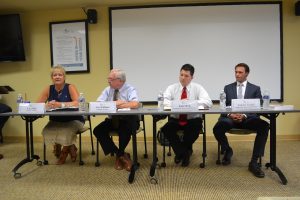
BERLIN – As the municipal election approaches, candidates shared their views on everything from annexation to economic development at a forum this week.
The town’s candidates for mayor, Gee Williams and Lisa Hall, and candidates for the District 2 council seat, Jack Orris and Zack Tyndall, participated in a forum hosted by the Coastal Association of Realtors (CAR) Wednesday. Councilman Elroy Brittingham, the District 3 representative, is running unopposed in the Oct. 4 election.
“Thank you all very much for coming out,” said Joseph Wilson, government affairs chairman for CAR. “We had a great turnout. Please be sure to go out and vote on Oct. 4.”
Candidates all agreed that the town’s people and its historic charm were what made it unique but began to differentiate themselves when they were asked for their views on annexation. Williams said it was a natural part of community growth. He said that for decades officials had been staunch in their refusal to extend town limits but that that had changed in recent years.
“I don’t think annexation helter skelter is the answer …,” he said. “What you do not control through annexation you leave up to total chance. I do not want to see sprawl.”
Hall, on the other hand, advocated for making use of Berlin’s roughly 300 existing infill lots. She also said the town could benefit from working with an urban planner.
“A town like Berlin needs to grow from within and protect its borders,” she said.
Tyndall and Orris both said annexation could allow for expansion over time. Tyndall said he thought the town needed to address its existing infrastructure needs first. Orris said he thought the town would benefit from continued strategic planning sessions.
When asked how the town could increase economic development, Orris suggested a continued cooperative effort among Berlin’s residents and merchants to use word of mouth to draw people to town.
“Word of mouth is the best advertising and it’s free,” he said.
Tyndall said the town should model Gov. Larry Hogan’s efforts in making the state “open for business.” He said if new businesses were faced with too many overhead costs they weren’t going to be able to succeed. He also suggested looking at the demographics of the town’s visitors.
“Focus on who they are, where they’re coming from, and spend our advertising dollars there,” he said.
Hall said she thought the town needed more places for residents to work. She said that as manufacturing jobs had disappeared throughout the United States, modern companies like Hardwire could prove critical to an area’s economic success.
“That’s the kind of businesses we need to find for Berlin,” she said. “Not all our children are going to college, not all our children are in the medical field. Some of them get tired of waiting tables in the summer and collecting unemployment in the winter. These are the people that want to work and want to stay in the area but where are they going to work?”
Williams said manufacturing jobs were not going to happen. He said the town’s leaders in recent years had been working on bringing jobs of the 21st century to Berlin.
“I am confident we are the cusp of bringing those jobs here,” he said. “The people qualified for that work don’t want to live in the city anymore and they don’t want to live in the suburbs anymore. The suburbs are the slums of the future.”
He added that the town didn’t want to attract just anyone.
“We need to be very careful and very targeted,” he said. “High tech and not classic manufacturing jobs is where that future is.”
Audience members asked the two mayoral candidates how the town could address junk properties. Hall, reminding attendees of the years it took to get a well-known Broad Street property cleaned up, said Berlin needed teeth in its code. She said if stronger fines were put in place and the code was enforced people wouldn’t neglect their properties.
“They’re only going to do what we allow them to do,” she said.
Williams agreed that the town had to make more of an effort.
“We need to be more aggressive but we don’t want to destroy what we’re trying to save,” he said.
Attendees asked the two young council candidates if they saw themselves in Berlin in 15 years.
“I do see myself here for the long haul,” Orris said. “I love it here. I love the people.”
Tyndall pointed out he’d grown up in Berlin, purchased a home in town and was getting married at the Atlantic Hotel later this month.
“I’ve weathered a lot of storms here,” he said.
One audience-submitted question said the town’s budget had grown substantially in recent years and asked the candidates how they planned to increase revenues.
Tyndall said the town’s power plant needed a new generator and could increase revenues if it was purchased. He also said bringing more businesses and residents to town would help its finances.
Orris agreed that bringing in more people and businesses would help but said he thought Berlin Falls Park could also help. He acknowledged that it would take funding to redevelop the park but said it could be a draw.
Williams told the audience that $3 million in the town’s latest budget was for capital expenditures and thus was a one-time expense. He said in recent years the town’s revenues had always exceeded expenses.
Hall said she thought the town’s spending was something that could be looked at, as her research had shown that the median population for a town in Maryland was 1,080 and that most had 10 employees and a budget of $1 million. Berlin, a town of just under 5,000 residents, has a staff of 70 and a budget of $19 million.
Following Wednesday’s forum, CAR endorsed Williams for mayor and Tyndall for the District 2 council seat.

